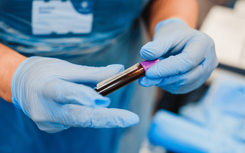
Thyroid function tests
The thyroid gland plays a key role in many body functions, from regulating your metabolism to keeping vital organs like your brain, heart, and muscles functioning correctly. So, when your thyroid gland isn’t functioning correctly and your thyroid hormone levels are too high or low, it can cause unwanted health symptoms. Fortunately, a simple blood test for thyroid function can provide vital insights into your thyroid health.
In this article, we explain different ways of checking thyroid function and how the insights they provide might be relevant to you.
To learn more about your thyroid health, why not book a private thyroid function blood test today?
What is the thyroid gland?
The thyroid gland plays an important role in the production and secretion of thyroid hormones. These hormones help the body regulate energy use, stay warm, and keep the brain, heart, muscles, and other organs working correctly.
The thyroid gland is located at the front of your neck. It is a butterfly-shaped gland made up of two lobes on either side of your windpipe, joined by a bridge of tissue called the isthmus.
You can find out more about your thyroid gland and the role it plays in our guide ‘What does your thyroid gland do?’
Why is the thyroid gland important?
The thyroid gland is important as it is responsible for helping to regulate many body functions, including:
- How your body uses energy
- Heart rate
- Breathing
- Digestion
- Body temperature
- Brain development
- Mental activity
- Skin and bone maintenance
- Fertility
If your thyroid gland is not working correctly it can lead to thyroid disease, which can be broken down into four main conditions:
- Hypothyroidism – this is when your thyroid doesn’t produce or release enough thyroid hormone.
- Hyperthyroidism – this is when your thyroid produces and secretes more thyroid hormones than your body needs.
- Goiter – this is an enlargement of your thyroid gland that can affect your thyroid’s function.
- Thyroid cancer – this is a type of cancer that begins in your thyroid tissue and can affect how the thyroid gland works.
To learn more about the different types of thyroid conditions and why checking thyroid function may be beneficial to you, read our guide ‘What does your thyroid gland do?’
What is a thyroid function test?
There are several thyroid function tests available, all offering different insights into your thyroid health. The most common blood tests for thyroid function include:
TSH Test
A TSH blood test measures the level of thyroid-stimulating hormone (TSH) in your blood. TSH is a hormone made in the pituitary gland that tells your thyroid gland how much thyroid hormone to produce. Learn more about what TSH is in our guide.
Changes in TSH levels often occur before the actual level of thyroid hormones in the body becomes too high or low, so this can be useful for picking up potential problems early.
A high TSH level indicates your thyroid gland is not making enough thyroid hormone, while a low TSH level indicates your thyroid is producing too much thyroid.
In healthy individuals, a normal TSH value indicates your thyroid is working correctly.
T4 Test
T4 is the main form of thyroid hormone circulating in the blood. There are two forms of T4 in your blood:
- Free T4 (FT4) – this is the active form of thyroxine hormone that enters your tissues where it’s needed.
- Bound T4 - this is thyroxine that attaches or binds to certain proteins that prevent it from entering your tissues.
As a result, T4 levels can be measured with either a free T4 or a total T4 blood test:
- A free T4 test measures the amount of free T4 in your blood. This is generally considered to provide more accurate information than a total T4 test and is commonly offered alongside a TSH for checking thyroid function.
- A total T4 blood test measures both free and bound T4 together, and then a calculation is used to work out how much T4 is free. This is a less accurate way to test how well your thyroid is working, which is why a free T4 test is more commonly used.
Elevated TSH and low FT4 levels can indicate primary hypothyroidism due to disease in the thyroid gland, while low TSH and low FT4 levels indicate primary hypothyroidism due to a problem with the pituitary gland.
A low TSH with an elevated FT4 is found in individuals with hyperthyroidism.
Understanding the T3 Test and Why Bluecrest Doesn't Include It
T3 blood tests are commonly used to diagnose hyperthyroidism or to help determine the severity of the condition, as people with hyperthyroidism typically have elevated T3 levels.
However, Bluecrest explicitly does not offer T3 thyroid function blood tests, as they are rarely helpful in hypothyroid patients. Abnormalities in TSH or FT4 levels usually appear first and provide more relevant diagnostic information.
Abnormal results
Abnormalities in your thyroid hormone levels, including your TSH and FT4 levels, can indicate a range of thyroid disorders.
If your blood test results are abnormal, you may be advised to undergo further tests, such as an ultrasound of your thyroid, to help determine the underlying cause.
Book a private thyroid hormone blood test
At Bluecrest Wellness, our private thyroid function test evaluates the health and functionality of your thyroid gland. This comprehensive test offers insights into both your TSH and FT4 levels as imbalances in these hormones can indicate thyroid disorders, such as hypothyroidism or hyperthyroidism.
You can book a private thyroid blood test at locations across the UK at a time to suit you. Plus, you can be confident that we will deliver fast, efficient and accurate results as we have established links with leading UK laboratories and are fully accredited for a wide range of private blood checks.























